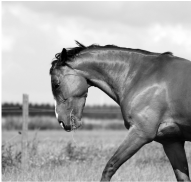You see, in my head I had planned a productive session: I was going to do a million transitions, practice a dressage test and work on lengthening the trot. The previous training session with the mare had left me dissatisfied with my work, so I was eager to train today to sooth my type A tendencies for perfection. Seeing clues indicating a challenging ride did not lift my spirits. While getting the mare ready, she ran off. While leading her out of the barn, she spooked. While playing on the ground in the arena, she was focused on anything but me. And, I got frustrated. Not with her, but with my own inability to focus myself on the positive. I started seeing how I almost tangled myself in the 22ft line. I watched how I gave her the wrong cue for a change of direction. I observed how I did not time my release quick enough. And my frustration grew. Not with her, but with myself. I told myself this was not a good day. That I was not in the right mindset to work with her. That I was doing it all wrong. And low and behold, the energy shifted. Instead of increasing her relaxation, which is usually the case when I work with the mare, she increasingly gave me bigger emotions. Bigger, and bigger, until, she lifted her front end up and stood tall on her hind legs; a beautiful sight, with her shiny copper fur catching the sunlight against the crisp blue arctic sky. It was over before we both knew it, and surprised us both. She came down and I asked her for a quick canter to blow off even more steam. While she cantered around me, I realized her big expression of emotion was a gift; it was bringing clarity to my emotions. It showed me I was creating a problem by thinking there was a problem. By thinking there was an issue with my skill level, with my state of mind, with the wind and with my ability, my body followed my mind, and got clumsy, and tense. And that feeling of inadequacy passed on to the mare, who followed my emotions and got increasingly more tense too. In all the years that I have worked with the mare, lately she has been the best ever, and ironically today was the first time she has ever felt the need to rear to get her point across. Boy, I must have been really deaf to her other, more subtle signs. And I was deaf, not because of the wind howling in my ears, but because my mind was too busy processing all the criticism I was shooting at myself. Now, was her behavior attitude? Or big emotions? Attitude has several meanings. In North American barns I sometimes hear riders suggest their horse has attitude, by which they mean the horse is somehow uncooperative, a spoiled brat, disobedient, being a jerk. The word attitude somehow seems to suggest that the only reason the horse shows behavior is its innate desire to be wrong, naughty, uncooperative. And it also suggests that we should teach it a lesson to not be that way, so it becomes a ‘nice’ horse, worthy of our affection and admiration. But is that reasonable? Or even realistic? Is the horse ever truly wrong, naughty, uncooperative? While I wasn't happy with the current state of my relationship with the mare, I felt the mare was none of those things; she wasn’t wrong or naughty. She seemed uncooperative with what I wanted her to be, but so was I, with what she needed me to be. She actually was cooperative with my unconscious expectations of her; I expected the worst, and that was what I got. I expected a rough session, and those expectations manifested themselves in an unfocused, disconnected, spooky, spirited horse with big emotions. After a quick canter I invited the mare to come hang out with me for a talk. As we stood quietly together, with the wind howling around us, I realized the greatest gift the mare gave me that day was that zenith of her big emotions; the rear. It was over before we both knew it. It almost seemed surreal, like I imagined it, but it caused a significant shift in both of our moods. After a while, I gently asked the mare to move outward again, but this time with more quietude in my heart. I started being softer in my cues, and she started being more responsive. She took some deep breaths and I in turn released the tension in my shoulders. As we progressed, she was still spooky, and I was still disappointed in my work, but the severity lessened more and more. We united together and ended on a more positive note, with an open, soft channel of communication between us, once more based on mutual trust and respect. As I invited her to walk back to her friends, and released her in the paddock, she kicked up her heels. I stood back in silence, took a deep breath and admired the beautiful sight of three spirited mares, frolicking in the cold February wind, just being who they are; horses, just horses and nothing else than that. Sounds good? Like to learn more? Stay in the loop by getting the latest news on horses, mindfulness and living your best live ever in your inbox.
8 Comments
9/27/2015 07:55:08 pm
very interesting information. By reading the article information is certainly very useful for me. Hopefully this experience also for other readers. I hope, the admin can always be updated to provide information such as this article in the future. Thank you very much.....
Reply
7/29/2016 02:29:51 am
Why in Indonesia character of citizens lack the aesthetic sense of ethics, because is really hard to say thank after they were given the information for free of charge as in any news story posted on this site.
Reply
6/19/2019 04:11:45 am
As of the moment, I can see that you don’t have a good relationship with your horse; which is understandable because you just had the mare earlier this year. There is always room for adjustment, and I guess you need to make an extra effort to make the horse feel that you are worth the trust. They may be animals, but they also have their now instinct that they would always follow more than your words. Don’t be disappointed because it’s all part of the process!
Reply
1/26/2023 11:11:54 pm
Wow, what an insightful and thought-provoking post! I can relate to the feeling of frustration and disappointment when things don't go as planned during a training session. I found it particularly interesting that the author mentioned the mare's big expression of emotion as a gift, as it brought clarity to her own emotions.
Reply
Leave a Reply. |
- EAC CERTIFICATION
- Services
-
About
- Testimonials
- FAQ
-
Find a Certified EquineFlow Practitioner
>
- Kim Carter CEP 2
- Maria Mersman CEP 2
- Donna Thomas CEP 2
- Shermane Abbott CEP 2
- Karen Hartney CEP1
- Roz Tyburski CEP 2
- Terry Farmer CEP 2
- Maren Reaves CEP 2
- Jennifer Thompson CEP1
- Allison Ragan CEP 1
- Charleen Snyder CEP1
- Cat Leonard CEP1
- Sara Griffith CEP 1
- Tiffany Owen Avirett CEP 1
- SHARON COOK CEP 1
- Robin Richardson CEP 1
- Trish Finley CEP1
- EquineFlow Excellence Awards
HoursM-T: 10am - 3pm
|
|
"We cannot direct the wind, but we can adjust the sails." - Dolly Parton



 RSS Feed
RSS Feed